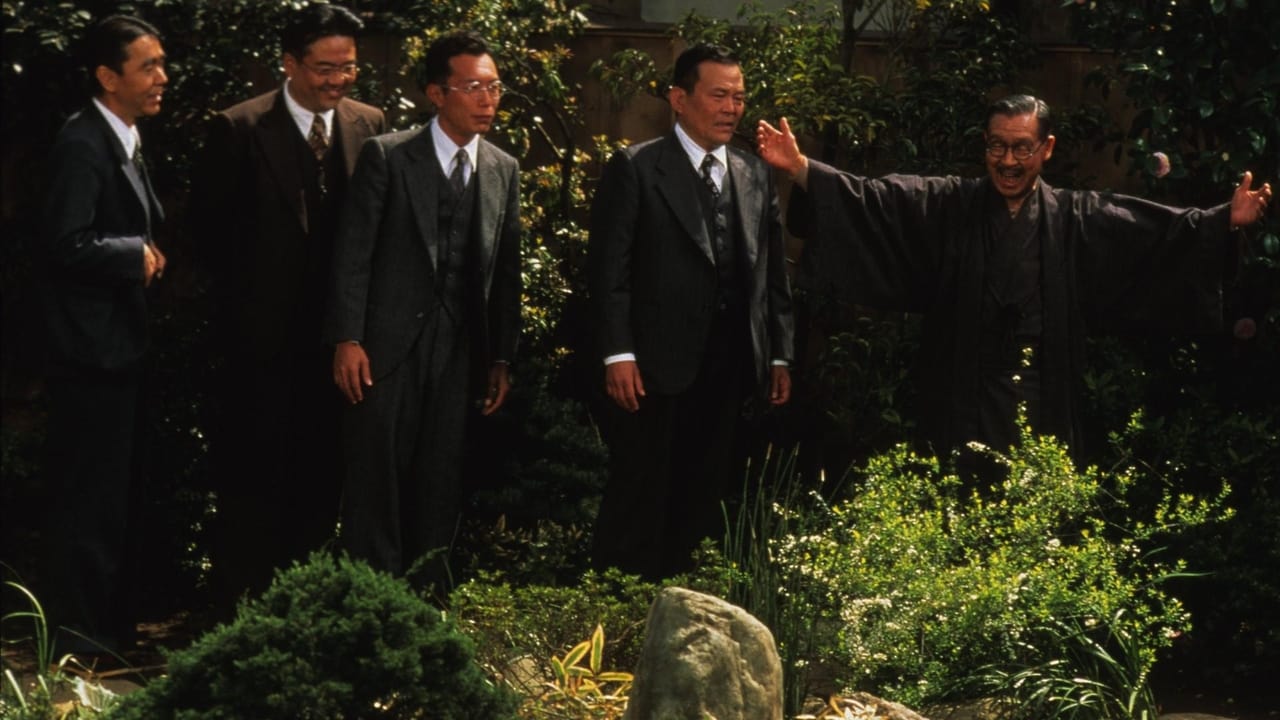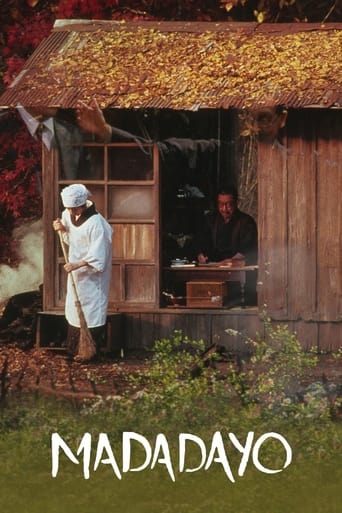

The question 'are you ready, are you ready to die?' is answered, as a commonplace, in the negative. Who of us is ready to die? None. Even old age, the harbinger of defeat, cannot accept the fate it portends: an untimely death, for all death is untimely. There is acceptance of death, sure, but no one, save the seldom few who are most miserable, invites it into their home. To me it is a truism that there is nothing more lucid and apparent and viscerally vocal than our united cry - Madadayo! But there is something more at play in this film than this pithy commonplace, something deeper. It is a masterpiece, and one sadly overlooked in his dense oeuvre.Why are you not ready to die? Here is the broader and more philosophical inquiry at the heart of this movie; and I invite you to look into your own life and recall the opulence of emotion in your most miserable moments, and to ask yourself unflinchingly why, if the egregiousness truly stacks above your head, like the loss of a beloved cat named Nora, do you continue to live in this world. What is the cause behind your proclamation - Madadayo! Is it affirmative, or is it a resignation? Misery befalls us all. But is misery all there is? Of course not, and Kurosawa rightly thinks not: "There is an enviable world of warm hearts." The professor tells it to us himself: he would have sunk into the mire of his despair had it not been for the kindness and generosity of his friends and relatives, and even those strangers unfamiliar with his plight.He has a crisis when he loses the cat and another one in the shack. Both times he is saved by his friends. There is much that happens in a man's life, much of it good, much ambivalent; he sees many evils and performs some, regrettably, himself.But the answer is there, in our lives, staring us in the face. Why are you not will to say you are ready for death? The world of warm hearts is astoundingly beautiful. It is beautifully portrayed in the movie, with heartfelt earnestness in the manner in which the students revere and support their professor; but, more to the point, it is also intrinsically beautiful. In the final scene the professor, now an old man, dreams himself a boy, a remembrance perhaps, and finds himself playing a game of hide and seek with some friends on a farm among conical stacks of hay. The boys on the road call out to him continuously, are you ready? as he tries to find a suitable hiding place among the hay. Madadayo (not yet) he exclaims to them. He then slowly covers himself with hay and just as he is about to say that he is ready for them (ready for death) the sun sets over the horizon of a surreal landscape imbued with green, orange and red, a multicoloured dream, and the camera pans up and over the sky, and it is here that we see the beauty of the world; it is this beauty, which is joined with the ethical, the kindness of people, that stops the young boy and the old man from saying that they are ready; it is this solemn beauty that keeps us all going, if we should choose, in our carousals and sojourns, to take notice of it. You are left with a broad smile on your face as you take leave of this master, and every time I think about him I am happy for the life he lived and sad that he departed us so soon.
... View MoreThis film brings sadness to me. Why? Because it's one of those films that you know doesn't have a happy ending, but it does. It's the encapsulation of an instructor's life, and how he's imparted his wisdom and knowledge to the students who worship him.As always, it's exceptionally well shot and well acted. The framing is perfect, and the staging of the action is heart warming. The small vignettes are what they are; slices of Japanese life from pre-war to post reconstruction, and all degrees in between. I don't have too much more to say on this film, because I wish it could end differently. I wish it could end where everyone gets together and they all have a picnic or something. I wish life could go on forever, and that no one would have to leave. and I guess that's the sense and broken promise that I get from this film. But, like Charles Schultz reminded us through Charlie Brown, sooner or later someone would have say goodbye.And that's what Madadayo is all about.
... View MoreMadadayo (1993) was the last film written and directed by the great Akira Kurosawa. Sadly, although the movie bears touches of Kurosawa's genius, it is not a truly memorable film.The plot follows the life of a kindly professor, who retires from teaching but who is revered, respected, and almost worshiped by his former students. The problem for me was that we see the professor's many child-like foibles--which the students don't appear to mind--but we never see any evidence of the professor's greatness.The professor taught German, not philosophy or religion, so the subject matter of his lectures couldn't have been inherently inspiring. We are never told what he said within or outside of class that brings about the fervent admiration of his students.After the professor retires, he suffers a series of unpleasant incidents--some serious and some trivial. In each case he students come together to help restore his life to balance. In addition, they have a highly formalized party on his birthday each year. Eventually they include their wives, children, and grandchildren in these laudatory ceremonies.The film is not boring, and it excels in the crowd scenes as well as in the scenes of wartime destruction, but it never provides a central core of substance that would have made the details and incidents meaningful.We saw this film at the excellent Dryden Theatre at George Eastman House in Rochester. However, most of the action takes place indoors, and I'm sure the movie would work well on the small screen.
... View MoreAt first I thought I would have to resist the sentimental clinging I expected for Madadayo, the final film written and directed by Akira Kurosawa (though it was not, from what I read in Emperor and the Wolf, necessarily his intended last project- then again, neither was Prairie Home Companion for Altman). But what can I say, except that maybe I'm a sucker for films that deal with a protagonist facing old age - done well, of course. In this case, Kurosawa decides to do a 180 from what he did in Ran, however still with the same emotional depths. If Ran was a plunge into the dark recesses of the human soul, where death and destruction (chaos as the title says) can occur, then so can there be joy and laughter and songs sung all for someone who can inspire a small quasi-community too. Sounds sappy, to be sure, but somehow Kurosawa is wise enough in his true golden years here to know that there can be a level of honesty, and a good level of fun, in dealing with potential problematic subject matter. I don't even know if I would recommend the picture to most Kurosawa fans, particularly the ones who dig into only his samurai films (the only inklings of death happen off-screen, to cats more than anyone else). But it struck a chord with me in a way only the movies can do.The professor is Hyakken Uchida (Tatsuo Matsumara, his first film for Kurosawa), and he's based on a real professor, who wrote many books and was also much beloved in Japan. There's no real story here, per-say, at least when comparing it to the tight structures of the director's bulk of work. It's a series of vignettes showing how, upon retiring from teaching, his students become his best friends and most ardent supporters through good and bad times. This includes his home being destroyed during WW2, attaining a new home (and the problems with that, at first), and also in the most tragic section of the picture when he loses his cat. The latter of these almost had me in tears, which is a little crazy as I almost never (sans Umberto D) feel emotionally tugged and pulled over a pet problem in a story. But by this point in the film there's been so much that's happened in the side of sweetness and joy with Uchida- his yearly celebration thrown by his students that involves revelry and drinking and songs and all that- as well as the great bits of wisdom and nuance, that this comes as an unfathomable shock. And it's in due really to how Tatsumara plays it, how the character is completely believable in having this intense vulnerability on the flip-side of his kindness and humility, and Kurosawa's tact with this story in general. It ranks up there with the best emotional scenes in Ikiru.But for the most part, Madadayo is a serene near-masterpiece of moods, and the primary mood here is that on the other side of despair, as Sartre once put it, life begins. Even through losing his house and seeing the rubble all around him, and the emotional crisis with the cat, Kurosawa's primary strengths here are in getting the little details perfect, the student characters that (perhaps a little underdeveloped) are totally indebted to the professor and love him like a kind of Sensai. The big 60th birthday celebration contains such little details sewn in, like the one character who wont stop naming the train-stations as everyone else around him sings and dances and gives speeches in revelry, and in its own minor-key way is like a supreme sequence to rank with Kurosawa's other major sequences in his films. There's also the little asides that show early on that Uchida is not just a conventional-lovable old man, but very intelligent and with an intuition that strikes to the core of matters. I also loved the moment when he says that if one isn't afraid of the dark, there's a defect in that person, without the side of imagination.Meanwhile, Kurosawa guides this work of two-thirds happiness and one-third sorrow in a very personal tone, as if he meditated on each scene before going into the cutting room. Rarely does he falter in getting the emotional notes right, even the sappy ones, and he gets from Uchida a fully rounded performance. He also decides to leave his film- with children in Uchida's dream doing the 'Not Yet' game- with one of his most staggeringly beautiful compositions (maybe an all-time great closing shot too). As I mentioned, I'm not even sure if Kurosawa knew this would be his last film, but he makes it as a light-hearted, humorous yet serious tome on living peacefully, loving both people and animals (feel the chill in the room when the character mentions skinning cats), and it's enlightening in how facing death is shown as a sign of the ultimate, superlative strength.
... View More